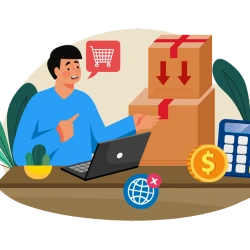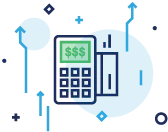TABLE OF CONTENTS
Business to Business or B2B payment processing is the modern way for businesses to pay each other. Traditionally, businesses have made payments by check or money orders. However, today’s automated world has dated these payment techniques for most modern businesses. Now, interest in B2B payment services is increasing globally. However, B2B payments can be tricky, as they are more complex than Business to Customer (B2C) or Person to Person (P2P) payments. If you’re interested in finding B2B solutions for your business, keep reading. This article will provide you with a definitive overview of B2B credit card processing and your options.
What is B2B Payment Processing?

B2B payment processing is an aspect of credit card processing that allows businesses to pay each other directly using a secure network. Transferring money between businesses requires B2B credit card processing to ensure invoices get paid in full and on time. With this, processors can tailor B2B processing to the needs of each particular business. While B2C transactions are almost all electronic, many businesses still rely on paper checks or ACH payments for transfers between each other.
However, with the emergence of digital technology, B2B payment processing has become more integrated within global industries. In basic terms, B2B payment processing represents an exchange of currency for services or goods between companies. This type of transaction happens only between businesses. These businesses may include retailers, corporations, wholesalers, or start-ups.
Because of recent demands and innovations in payment technologies, shifts to business payment systems have been made in the global marketplace. Now, payment systems must include the steps required to support a company’s payment cycle. Along with many other features, payment gateways are now set up to manage various transaction types, including B2B payment processing.
Types of B2B Business Payments
Businesses have different B2B payment processing requirements. While some companies use payment systems to invoice customers and receive payments by ACH or check, other businesses rely on B2B credit card processing.
Therefore, it is important to know the various types of B2B business payments you can use to send and receive money. This allows you to clearly understand your options. Will you be receiving cash payments? Will you accept them by credit card, check, ACH payment, digital platforms, or wire transfer? Additionally, knowing the design and functions of payment gateways enables you to make better transaction decisions.

Cash
When paying online, businesses normally choose to transfer money from their checking account, by credit card, or through a money transfer provider. Therefore, debiting cash electronically through online money transfers comes the closest to paying with physical cash in this medium. Money transfer systems, such as PayPal, often replicate the traditional means of cash or money order payments. This is because paying in cash is difficult to manage unless your client is local. Even then, it can be inconvenient and hard to track if anything goes wrong in the exchange of funds. If the business is local and the sum isn’t astronomical, cash can be a convenient way to process a B2B payment.

Credit Cards
Credit card processing is used extensively for B2C and B2B business transactions. If a business needs more time to reconcile the cost of something owed, it will usually pay with a credit card. Setting up your business for B2B credit card processing is relatively easy, as credit cards are a popular way to pay.
Credit cards have been an integral payment method since the middle of the twentieth century. Therefore, they are ingrained in B2B credit card processing solutions. Incentives, such as cashback rewards and lower interest rates have led businesses to approve of this payment method. A business’s use of a credit card often relies heavily on its credit score. If this is a pain point, utilize another method instead.

Checks
Checks are still one of the most popular ways to accept payments from businesses in the U.S. While writing a check and sending it by post takes additional time, it also increases the chances the check will clear and the money will be available to the recipient. Of course, this assumes a business will cash a check on the day they receive it, which may not happen.
Because a business doesn’t really know when a check will be cashed, late fees can occur from time to time. While the use of checks continues to decrease, this form of payment still dominates B2B payment processing because of its security features and widespread acceptance. It’s also safer than the cash alternative for businesses outside of your vicinity.

ACH Payments
Both domestic and global ACH payments are available for B2B payment processing. Automated Clearing House (ACH) transfers are convenient and inexpensive ways to send and accept payments. This form of transfer requires the payee’s bank account number and an ABA routing transit number.
The routing number is typically the first set of digits on the bottom of deposit slips and paper checks. The second set of numbers normally represents the account number. In the U.S., the ACH provides a cross-bank transfer network so payments can clear in a timely fashion. Usually, it takes about two days for payments to clear and settle. Once an initial payment has been made through ACH, recurring payments can be set up for subsequent transactions.

Wire Transfers
Also known as credit transfers or remittance transfers, wire transfers are both reliable and fast, and can be done globally. These types of transfers allow a direct connection between business bank accounts. Your business can manage recurring changes in cross-border transactions by using wire transfers. While these are convenient and fast, they’re also the most expensive method of transferring funds. Therefore, this type of transfer arrangement will not work well if you have a large number of businesses to pay.

Payment Gateways
Gateways are the technology that allows a business to accept debit or credit card payments from purchasers. However, it should be noted that payment gateways are different from virtual terminals. For example, gateways do not solely include physical card-readers, but also cover payment processing portals for businesses that operate online. Some brick-and-mortar gateways accept payments from customers by phone, using Near Field Communication (NFC) technology.
Payment gateways can represent various types of card-accepting systems–from point-of-sale systems to checkout portals that accept credit card payments online. In fact, a payment gateway is the main component of electronic payment processing. The front-end technology sends a customer’s details to a financial institution that processes the transaction.
One of the most well known payment gateway providers is Authorize.net (a Visa company). Not only is it one of the oldest and well-built gateway, it also has the most security features built-in. An Authnet gateway could be a great option for your business if you want the best solution on the market.
Payment gateway technologies continue to evolve to reflect new abilities. At one time, all terminals only accepted credit cards with magnetic strips and required a paper signature. However, as time has progressed, chip technologies phased out signatures in favor of a Personal Identification Number or PIN. Today, many businesses offer contactless purchases, allowing customers to use their smartphones for payment instead of their credit cards.

Digital Platforms
Almost everyone in the U.S. uses a cell phone of some kind, with 81% of users owning a smartphone. With the large number of users going mobile, the use of digital payment platforms has increased by leaps and bounds.
Global contactless payments came to just over $8 billion in 2017 and are expected to triple in the next 10 years. This is because businesses are quickly adopting digital platforms, as they offer a more direct and secure way to complete payment transactions. By implementing a digital platform, businesses can accept payments without worrying about fraud or issues with security. This drives more and more businesses to accept digital payments.
The Benefits of B2B Credit Card Processing

When you realize the benefits of B2B credit card processing, you will find this form of bookkeeping will steadily improve your operations and keep your business on track for expansion and growth. Not only does B2B credit card processing improve your company’s cash flow, but it also simplifies bookkeeping while heightening security. Let’s take a closer look at these key attributes.
Improved Cash Flow
Starting any business is a risky activity, as about half of businesses fail after 5 years. The most common reason businesses fail is due to cash flow. By automating more of your B2B payments rather than depending on paper checks, you can easily manage and analyze your incoming and outgoing cash.
A B2B payment processing system also makes it less strenuous for businesses to pay other businesses. For instance, invoicing platforms can make credit card payments in a single click. This makes it much simpler for you to receive payments. Rather than waiting on a paper check to arrive by mail, you can receive the money in your bank account faster, which also shores up more of your cash flow.

Simplified Recordkeeping
B2B credit card processing also simplifies recordkeeping, or accounts receivable and accounts payable transactions. While managing checks from different sources can lead to lost checks or recording errors, B2B credit card solutions can automatically record payments. On top of this, payment apps can be integrated with your recordkeeping software to make filing taxes much simpler.
Additionally, by using software and apps designed for B2B payment processing, you can monitor your accounts payable and receivable in real-time. For instance, with the right automation in place, you can easily monitor late payments. In turn, you can either stop working with those companies or enforce a stricter payment policy. Much like writing a return policy for customers, enacting a payment window policy with the businesses you work with can keep everything on pace.

Heightened Security
When you use today’s software for B2B payment processing, you can secure the payments you receive, thereby making payment transactions safe and fast. Because mail theft can be a problem, switching to B2B payment processing makes sense because it protects your information. While digital solutions are not immune to breaches in security, most payment providers have data engineers and professionals working to keep the data they process safe. It’s also easier and faster to follow the paper trail of a digital payment than a written check.
What Rates Should You Expect?
The average credit card processing fees can vary depending on your provider. To upgrade to a B2B payment processing system, there is a small cost. For credit card processing, expect to pay about 2.75% to 2.90% per transaction. What you pay, of course, will also depend on the form of processing payments and any other upgrades you choose. For instance, some merchant service providers charge you a fee (around $30) on top of transaction fees to accept payments by phone, fax, and mail. However, the cost you pay is well worth the time you save in receiving payments and maintaining a healthy cash flow.
What to Look for in a B2B Payment Platform
What you choose for a B2B payment platform will be based on your unique needs as a business. You also need to pinpoint certain qualities – qualities that will serve your business professionally and financially.
Your B2B payment processing platform should propel your business forward and improve how you receive money or payments digitally. Therefore, you’ll need to exercise some due diligence by seeking the qualities that will keep your business operational and progressive.

1. Utility
The platform should be versatile enough to serve more than one of the various payment needs. Make sure you work with a provider that can offer a variety of solutions, based on your business type and size.

2. Dependability
Payments happen often, especially in today’s growing marketplace of technology and software. To accommodate this, make sure to choose a reliable platform that has the tools you need to accept payments as they occur each day. Consider using a merchant services provider with responsive customer service agents to help you troubleshoot issues.

3. Integration and Implementation
Can your B2B credit card processing or payment platform easily integrate with your existing computer system? Your payment solution platform should be compatible with your payroll or accounting software programs. Therefore, it’s important to make sure the platform works with your existing software and is simple to integrate. Ask your prospective merchant services provider about the integrations they offer.

4. Ease of Use
Besides being easy to integrate, your B2B payment processing platform should also be easy to use. Make sure the solution you choose is both fast and intuitive. Ask for demonstrations so you can get a better idea of what you’ll be using.
B2B Payment Processing: Closing Thoughts
Now that you know about some of the innovative B2B payment processing solutions available to you, it’s time to incorporate them into your company’s operations. Not only will your business benefit from using a B2B digital platform, but it will also make it easier for your business customers to pay you, both securely and on time. Don’t jeopardize your cash flow. Make sure you have a reliable payment processing solution to keep your cash flow steady and business functioning.






